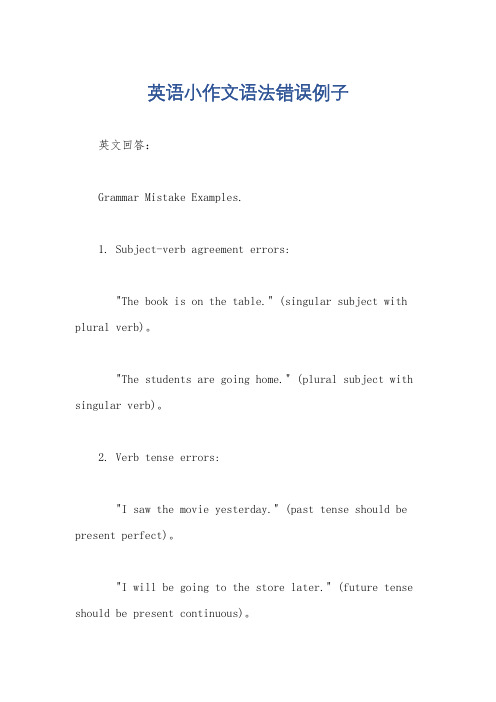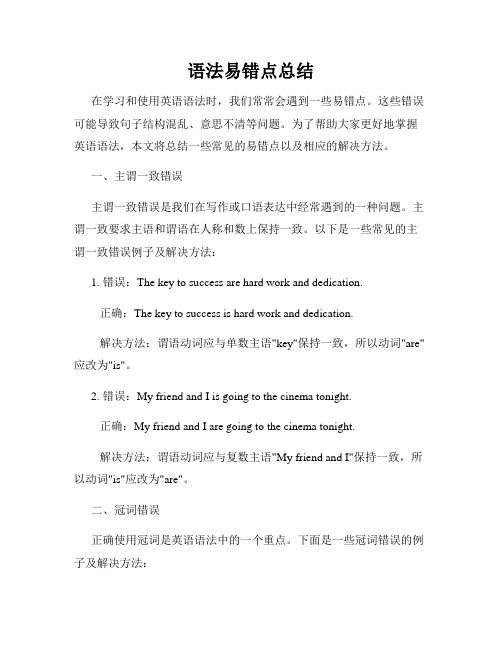英语语法错误经典例子(一)
英语小作文语法错误例子

英语小作文语法错误例子英文回答:Grammar Mistake Examples.1. Subject-verb agreement errors:"The book is on the table." (singular subject with plural verb)。
"The students are going home." (plural subject with singular verb)。
2. Verb tense errors:"I saw the movie yesterday." (past tense should be present perfect)。
"I will be going to the store later." (future tense should be present continuous)。
3. Pronoun errors:"I gave the book to she." (incorrect pronoun case)。
"The dog and cat are playing with each other." (incorrect pronoun reference)。
4. Adjective and adverb errors:"The car is very fast." (incorrect use of adverb)。
"The book is more interesting than the movie." (incorrect use of comparative adjective)。
5. Preposition errors:"I went to the store at the street." (incorrect preposition)。
语法易错点总结

语法易错点总结在学习和使用英语语法时,我们常常会遇到一些易错点。
这些错误可能导致句子结构混乱、意思不清等问题。
为了帮助大家更好地掌握英语语法,本文将总结一些常见的易错点以及相应的解决方法。
一、主谓一致错误主谓一致错误是我们在写作或口语表达中经常遇到的一种问题。
主谓一致要求主语和谓语在人称和数上保持一致。
以下是一些常见的主谓一致错误例子及解决方法:1. 错误:The key to success are hard work and dedication.正确:The key to success is hard work and dedication.解决方法:谓语动词应与单数主语"key"保持一致,所以动词"are"应改为"is"。
2. 错误:My friend and I is going to the cinema tonight.正确:My friend and I are going to the cinema tonight.解决方法:谓语动词应与复数主语"My friend and I"保持一致,所以动词"is"应改为"are"。
二、冠词错误正确使用冠词是英语语法中的一个重点。
下面是一些冠词错误的例子及解决方法:1. 错误:I want to eat apple.正确:I want to eat an apple.解决方法:在表示泛指的情况下,应使用不定冠词"a/an"来修饰可数名词单数形式。
2. 错误:She is student.正确:She is a student.解决方法:在表示身份、职业或身份的名词前,一般需要使用不定冠词"a/an"。
三、时态错误时态错误是指在表达过去、现在或将来的动作或状态时,使用了错误的时态。
高考必考语法改错之系动词十大经典错误

• eat continue last remain • ⑤ ⑥ ⑦ continue ⑧ stay
• taste keep remain leave
系动词知识体系
系动词十大典型错误例析
【改错】高考链接 少be动词
Байду номын сангаас
1.CThhienya^eaangdear stokekdnomwe
everything about lots of questions.
were
注意! be eager to do …渴望做某事
系动词十大典型错误例析
【改错】高考链接 少be动词
2.kI’ndolwikemtoor^eyoaubropuet ny-ofurirencodu, anntrdy.get to
His hands feel coldly.
• 在英语中,某一动词是多义词,既有实义 动词用法,又有系动词用法。学生务必弄 清其二者区别。切忌把二者混为一谈,这 也是会考、高考常见考点。此类常见易混 词有:
• change listen look touch • ① turn ② hear ③ see ④
time.
注意! 注意:如果一个职位在一定
2)W时 名e期 词el内做ec由表te一语d h个、im人 宾m担 补o任 和nit时 同or, 位of这 语o个 时ur 表,cla示常ss职不. 位用的冠
词。
3)Mr.Hunter,captain of the team,loves
playing football.
练
being
系动词十大典型错误例析
【改错】
3.They gradually b_e_c_am__e to enjoy their
英语语法错误分类(史上最全)

一.不一致(Disagreements)所谓不一致不光指主谓不一致,它还包括了数的不一致时态不一致及代词不一致等.例1.When one have money ,he can do what he want to .(人一旦有了钱,他就能想干什么就干什么.)剖析:one是单数第三人称,因而本句的have应改为has ;同理,want应改为wants.本句是典型的主谓不一致.改为:Once one has money ,he can do what he wants (to do)二.修饰语错位(Misplaced Modifiers)英语与汉语不同,同一个修饰语置于句子不同的位置,句子的含义可能引起变化.对于这一点中国学生往往没有引起足够的重视,因而造成了不必要的误解.例1.I believe I can do it well and I will better know the world outside the campus.剖析:better位置不当,应置于句末.三.句子不完整(Sentence Fragments)在口语中,交际双方可借助手势语气上下文等,不完整的句子完全可以被理解.可是书面语就不同了,句子结构不完整会令意思表达不清,这种情况常常发生在主句写完以后,笔者又想加些补充说明时发生.例1.There are many ways to know the society. For example by TV ,radio ,newspaper and so on .剖析:本句后半部分"for example by TV ,radio ,newspaper and so on .”不是一个完整的句子,仅为一些不连贯的词语,不能独立成句.改为:There are many ways to know society ,for example ,by TV ,radio ,and newspaper.四.悬垂修饰语(Dangling Modifiers)所谓悬垂修饰语是指句首的短语与后面句子的逻辑关系混乱不清.例如:At the age of ten, mygrandfather died. 这句中"at the age of ten"只点出十岁时,但没有说明” 谁”十岁时.按一般推理不可能是my grandfather, 如果我们把这个悬垂修饰语改明确一点,全句就不那么费解了.改为:When I was ten, my grandfather died.例1.To do well in college, good grades are essential.剖析:句中不定式短语“to do well in college” 的逻辑主语不清楚.改为:To do well in college, a student needs good grades.五.词性误用(Misuse of Parts of Speech)“词性误用”常表现为:介词当动词用;形容词当副词用;名词当动词用等.例1.None can negative the importance of money.剖析:negative 系形容词,误作动词。
常见英语语法错误

常见英语语法错误1.句子成分残缺不全We always working till late at night before taking exams.(误)We are always working /We always work till late at night before taking exams(正)We should read books may be useful to us. (误)We should read books which may be useful to us. (正)2.句子成分多余This test is end, but there is another test is waiting for you. (误)One test ends, but another is waiting for you. (正)The driver of the red car was died on the spot. (误)The driver of the red car died on the spot. (正)3.主谓不一致Someone/Somebody think that reading should be selective. (误)Some think that reading should be selective. (正)My sister go to the cinema at least once a week. (误)My sister goes to the cinema at least once a week. (正)4.动词时态、语态的误用I was walking along the road, and there are not so many cars on the street. (误)I was walking along the road and there were not so many vehicles on the street. (正)We have little time to read some books which we interest. (误)We have little time to read some books in which we are interested. (正)I am a student who has studying in the college for two years. (误)I have been studying in the college for two years(正)5.词类混淆It is my point that reading must be selectively.(误)In my opinion, reading must be selective. (正)Honest is so important for every person. (误)Honesty is so important for everyone. (正)The old man was hit by a car when he across the street.(误)The old man was hit by a car when he was crossing the street. (正)6.名词可数与不可数的误用Too much tests are d isadvantage for students’ study. (误)Too many tests are disadvantageous to students. (正)In modern society, people are under various pressures(误)In modern society, people are under various kinds of pressure. (正)7.动词及物与不及物的误用The traffic accident was taken place at the junction of two highways. (误)The traffic accident took place at the junction of two highways. (正)Because of his excellent performance, the boss rose his salary. (误)Because of his excellent performance, the boss raised his salary. (正)8.介词to和不定式符号的混淆Too many tests will do harm to cultivate our independent thinking. (误)Too many tests will do harm to the cultivation of our independent thinking. (正)All these contributed to solve the serious problem. (误)All these contributed to the solution to the serious problem. (正)9.情态动词的误用It may not good to our health. (误)It may be not good to our health. (正)They should spent much time. (误)They should spend much time. (正)10. There be句型的误用There exists some new problems such as being dishonest. (误)There exist/arise some new problems such as being dishonest. (正)There are many way to solve the tuition and fees of college education. (误)There are many ways to raise the money for the tuition and fees for college education. (正)1.动宾搭配不当We must pay attention to it and make solutions to the problem. (误)We must pay attention and find a solution to the problem. (正)It also may help you to make success. (误)It may also help you succeed/obtain your goal. (正)2.根据中文逐字硬译If someone’s family situation is not well, he can apply for loan to bank. (误)If one’s family is not well off, he can apply to the bank for a loan. (正)Let alone touch the outside world of campus/keep a good body health(误)Let alone get in touch with the world outside of the campus/keep fit(正)上面这些错误比较典型、集中,请大家务必要注意,其他的错误,如单词拼写、大小写、标点符号的误用等,可谓千姿百态,无奇不有,在此就不一一列举。
初中英语中考作文常见语法错误整理(共8种)

中考英语作文常见语法错误1.主谓不一致写作时,要注意谓语动词和主语保持一致,同学们容易受汉语思维的影响,不去考虑主语的人称,是单数还是复数。
【错误】例1: A number of students is going to learn a foreign language.例2: He go to school by bike every day.【正确】例1: A number of students are going to learn a foreign language.(许多学生打算学一门外语)例2: He goes to school by bike every day.(他每天骑自行车上学)【分析】例1: 句中a number of +复数名词做主语时,其谓语动词用复数形式例2: He是第三人称单数,在一般现在时态中谓语动词go应该加es2.时态错误写作中经常在时态方面犯错误。
英语时态种类繁多,动词的构成形式随着时态的变化而变化。
动作或动词的时间由跟在动词后的诸如“着”、“了”、“过”等副词来表示,对同学们来说,掌握英语的时态不是很容易。
【错误】例1: A baby can cry as soon as it was born.例2: I will not come here if it will rain tomorrow.【正确】例1: A baby can cry as soon as it is born.(婴儿一出生就会哭)例2: I will not come here if it rains tomorrow.(如果明天下雨,我就不来了)【分析】例1: 对于常识问题,应该用一般现在时态。
例2: "主将从现",即主句一般将来时,从句一般现在时态3.语态错误动词的被动式在英语中比比皆是,被动式要求有助动词be和一个变异的过去分词形式,其中这个助动词带有时态和人称数量信息,诸如中文里的“被”、“使”、“让”等词语。
科技英语常见语法错误_13new

4.省略法
翻译时,可省去冠词、代词、介词、连词或短语等。
[例句]If you know the frequency, you can find the wavelength. [译文]如果知道频率,就可求出波长。(代词you省译) [例句]As we know, electrons revolve about the nucleus, or center, of an atom. [译文]正如我们所知,电子围绕原子核旋转。(nucleus与 center表示同一意思,所以省译)
(2) 代词与其先行词不一致 [例句] If one can build the chip big enough or fast enough, then it seemingly does not matter if you use inefficient algorithms. (应将you use改为he uses,或者将one改为 you) [译文] 若有人能设计出容量足够大或者速度足够快的芯片, 那么人们采用效率低的酸法似乎并没有什么关系。 [例句] These kind of studies was not started until the new experimental equipment was put to use. (指示代词与其 所修饰的名词不一致,应改为These kinds of studies were 或This kind of study) [译文] 这类研究直到新的实验设备投入使用后才开始进行。 (3) 时态与时间不一致 [例句] As is known to all, mobile communication began its development since 1980. (应将since改为in) [译文] 众所周知,移动通信的研制始于1980年。
中学英语中常见的语态错误

中学英语中常见的语态错误Introduction语态是英语语法中一个非常重要的部分,它是指描述动作或行为发生的方式或状态。
中学生在学习英语语态时常会出现错误。
这篇文章将介绍中学生在学习英语语态时最常犯的错误,并提供相应的解决方法。
Active & Passive Voice标准的(也是最基本的)语态是主动语态和被动语态。
主动语态描述主语执行动作。
例如,Sam ate the sandwich。
被动语态描述主语承受动作。
例如,The sandwich was eaten by Sam。
错误1: 对于这两种语态,学生常常不清楚它们的区别,造成混淆。
解决方案: 给学生以清晰的解释来帮助他们理解两种语态的区别,并提供一些简单的例子。
错误2: 学生常常在无意识之中混淆主动语态和被动语态,导致语序混乱。
解决方案: 将该讨论问题的概念和技能,单独讨论。
开展特定的练习和例子,鼓励学生在不同的上下文中学习和使用它们。
错误3: 学生常常错误使用主动语态和被动语态的时态。
解决方案: 重新强调被动语态和主动语态在不同的时态中应该如何使用。
Modal Verbs情态动词也是英语语态中不可少的一部分。
它们在语态学习中经常被用作辅助动词。
错误4: 学生经常在使用了情态动词后犯错,因为他们不理解它们应该如何改变。
解决方案: 提供一个简单的情态动词表格,并对每个动词的不同用法进行详细讨论。
错误5:在使用情态动词时,学生常常不正确地使用主动语态或被动语态。
解决方案: 在教授语态时,要让学生清楚地掌握如何识别不同的情态动词,并学习在不同语态中的正确使用方式。
Conclusion教授语态需要耐心和剧烈重点,为学生创造一个理解和实践的机会。
通过让学生在不同的情境和文本情况下练习语态,培养他们的语言技能。
最终,教师可以为学生提供额外的题目或者练习资料,以帮助他们更好的掌握语态规则,提高语言能力。
- 1、下载文档前请自行甄别文档内容的完整性,平台不提供额外的编辑、内容补充、找答案等附加服务。
- 2、"仅部分预览"的文档,不可在线预览部分如存在完整性等问题,可反馈申请退款(可完整预览的文档不适用该条件!)。
- 3、如文档侵犯您的权益,请联系客服反馈,我们会尽快为您处理(人工客服工作时间:9:00-18:30)。
英语语法错误经典例子(一)
1. 这本小说我已读了三遍。
误:I've read the novel the third time.
正:I've read the novel a third time.
析:要表示数量或序数的增加, 在序数词前用不定冠词。
又如:He saw a second plane. 他又看到了第二架飞机。
2. 他在公共汽车后面追,并追上了。
误:He ran after the bus, and could catch it.
正:He ran after the bus, and was able to catch it.
析:表示过去特定情况下的能力,可用was (were) able to 而不能用could,不过这种差异在否定句中便不存在了。
如:He ran after the bus but wasn't able to [couldn't] catch it.
3. 我正要上床睡觉,这时电话铃响了。
误:I was about to going to bed when the telephone rang.
正:I was about to go to bed when the telephone rang.
析:be about to do sth 是习语,其意为“正要做某事”,此处的about(有的词典认为是形容词)之后通常应接不定式,不接to doing sth。
4. 他接受过良好的教育。
误:He accepted a good education.
正:He received a good education.
析:虽然在通常情况下,accept=接受,receive=收到,但并不是说汉语中所有的“接受”都可用accept 来对译。
5. 他做这事是偶然的,还是故意的?
误:Did he do it on accident or by purpose?
正:Did he do it by accident or on purpose?
析:by accident 是习语,表示“偶然地”;on purpose 也是习语,表示“故意地”,注意两者介词的搭配不能混淆。
6. 你怎么解释事故的原因?
误:How can you account the accident?
正:How can you account for the accident?
析:account 用作动词时,表示“认为”,是及物动词;表示“解释”“说明”等,是不及物动词,若需后接宾语,通常借助介词for。
7. 不要杞人忧天。
误:Don't across the bridge until you come to it.
正:Don't cross the bridge until you come to it.
正:Don't walk across the bridge until you come to it.
析:across 是介词或副词(不是动词),cross 是动词。
8. 你要想卖掉你的产品,你就得为此登广告。
误:If you want to sell your product you must advertise for it.
正:If you want to sell your product you must advertise it.
析:advertise for sth (sb) 意为“登广告征求或寻找某物或某人”(此时advertise 是不及物动词);若要表示“为……登广告”或“登广告宣传……”,advertise 是及物动词,其后要直接跟被宣传的东西作宾语。
9. 他建议我同他们一起去。
误:He advised me going with them.
正:He advised me to go with them.
析:advise(建议)之后不能用不定式作宾语,但可接不定式的复合结构作宾语。
注意这类句型的被动语态:You would be well advised to stay indoors. 你最好呆在家里。
10. 气候变化会影响你的健康。
误:The change in climate will affect your health.
正:The change in climate will affect your health.
析:affect 和effect 两者都可以表示“影响”,但用作此义时,affect 是动词,而effect 是名词。
虽然effect有时也用作动词,但它不表示“影响”,而表示“实现”“产生”等。
